Cross-Cultural Management Podcast: Hydro Generation in Tanzania
VerifiedAdded on 2022/11/28
|12
|2781
|241
Project
AI Summary
This assignment presents a podcast script and a reflective analysis focused on cross-cultural management challenges faced by US Hydro Generation (HG) in Tanzania. The podcast addresses issues of nepotism, ethical practices, and leadership within the context of a dam project. The script examines the case of Brett Jones, a manager whose practices in Tanzania raised concerns about cultural adaptation and ethical standards. The reflection delves into relevant theories, including deontological ethics and Hertzberg's motivational theories, and explores the impact of cultural differences, particularly the power distance index. The assignment highlights the importance of cross-cultural training and its role in fostering effective communication and ethical conduct within international projects. The student discusses the Hofstede model and analyzes the differences between US and Tanzanian cultural norms to provide insights into the complexities of managing projects in diverse cultural settings.
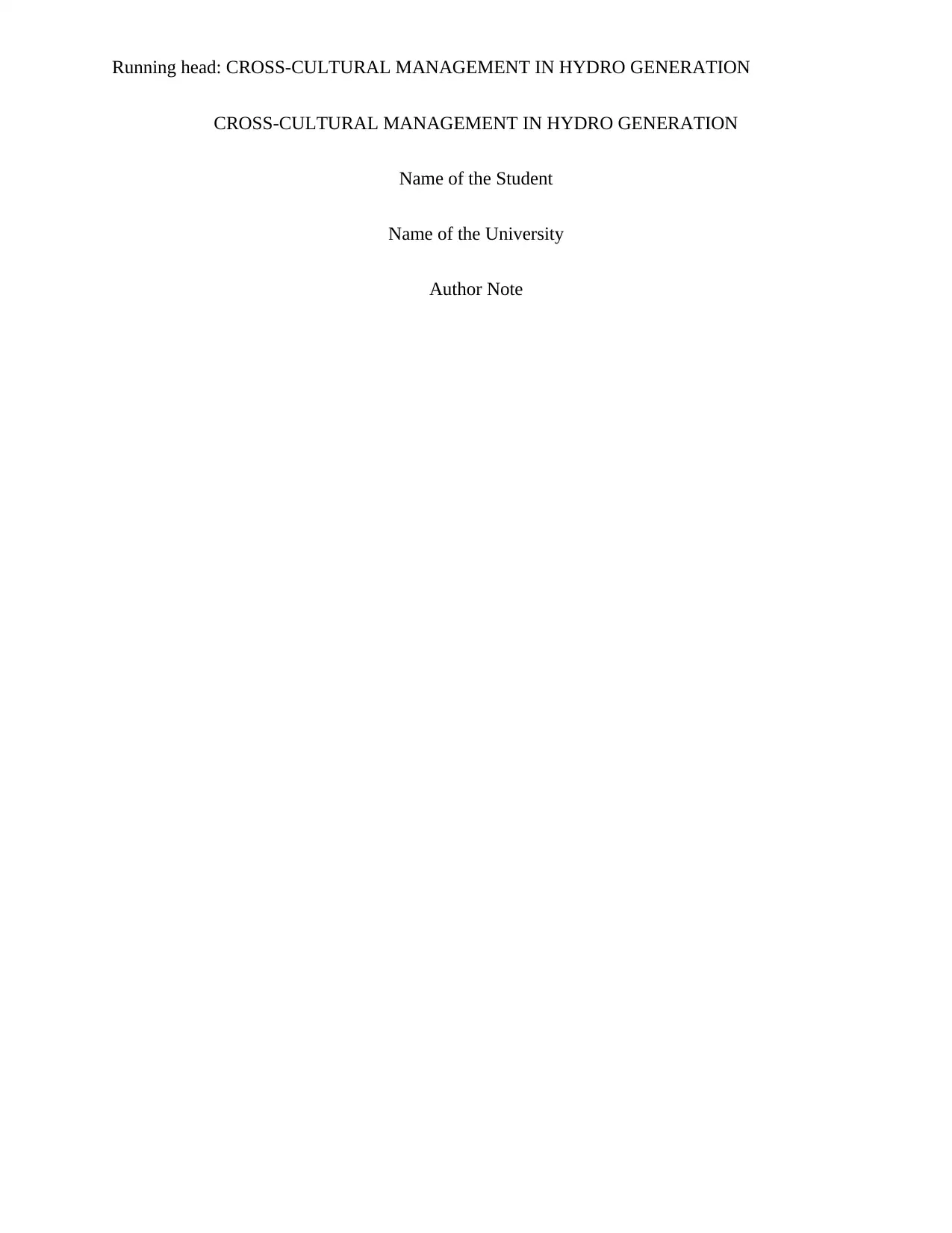
Running head: CROSS-CULTURAL MANAGEMENT IN HYDRO GENERATION
CROSS-CULTURAL MANAGEMENT IN HYDRO GENERATION
Name of the Student
Name of the University
Author Note
CROSS-CULTURAL MANAGEMENT IN HYDRO GENERATION
Name of the Student
Name of the University
Author Note
Paraphrase This Document
Need a fresh take? Get an instant paraphrase of this document with our AI Paraphraser

1CROSS-CULTURAL MANAGEMENT IN HYDRO GENERATION
Table of Contents
Podcast.................................................................................................................................2
Reflection.............................................................................................................................4
References............................................................................................................................9
Table of Contents
Podcast.................................................................................................................................2
Reflection.............................................................................................................................4
References............................................................................................................................9
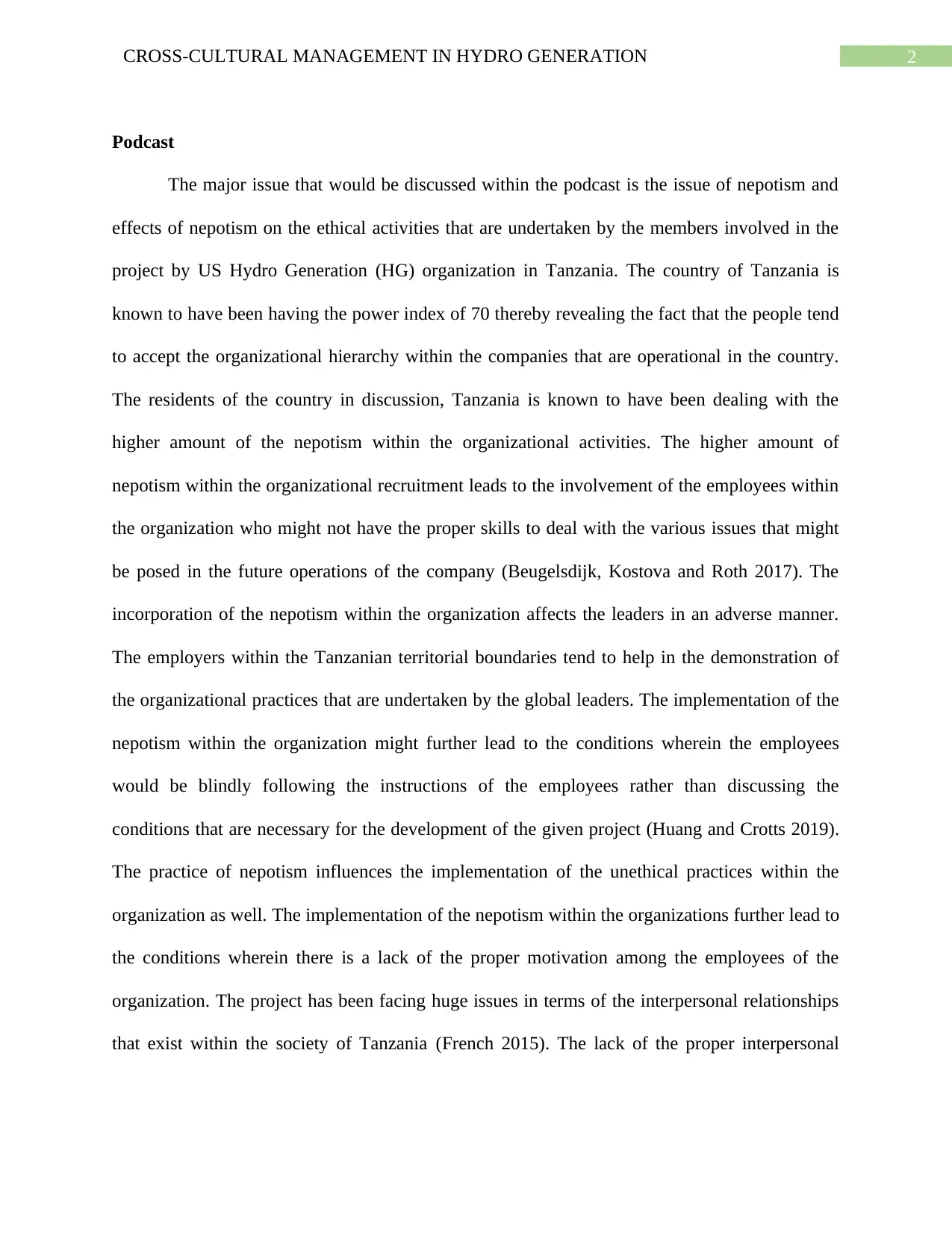
2CROSS-CULTURAL MANAGEMENT IN HYDRO GENERATION
Podcast
The major issue that would be discussed within the podcast is the issue of nepotism and
effects of nepotism on the ethical activities that are undertaken by the members involved in the
project by US Hydro Generation (HG) organization in Tanzania. The country of Tanzania is
known to have been having the power index of 70 thereby revealing the fact that the people tend
to accept the organizational hierarchy within the companies that are operational in the country.
The residents of the country in discussion, Tanzania is known to have been dealing with the
higher amount of the nepotism within the organizational activities. The higher amount of
nepotism within the organizational recruitment leads to the involvement of the employees within
the organization who might not have the proper skills to deal with the various issues that might
be posed in the future operations of the company (Beugelsdijk, Kostova and Roth 2017). The
incorporation of the nepotism within the organization affects the leaders in an adverse manner.
The employers within the Tanzanian territorial boundaries tend to help in the demonstration of
the organizational practices that are undertaken by the global leaders. The implementation of the
nepotism within the organization might further lead to the conditions wherein the employees
would be blindly following the instructions of the employees rather than discussing the
conditions that are necessary for the development of the given project (Huang and Crotts 2019).
The practice of nepotism influences the implementation of the unethical practices within the
organization as well. The implementation of the nepotism within the organizations further lead to
the conditions wherein there is a lack of the proper motivation among the employees of the
organization. The project has been facing huge issues in terms of the interpersonal relationships
that exist within the society of Tanzania (French 2015). The lack of the proper interpersonal
Podcast
The major issue that would be discussed within the podcast is the issue of nepotism and
effects of nepotism on the ethical activities that are undertaken by the members involved in the
project by US Hydro Generation (HG) organization in Tanzania. The country of Tanzania is
known to have been having the power index of 70 thereby revealing the fact that the people tend
to accept the organizational hierarchy within the companies that are operational in the country.
The residents of the country in discussion, Tanzania is known to have been dealing with the
higher amount of the nepotism within the organizational activities. The higher amount of
nepotism within the organizational recruitment leads to the involvement of the employees within
the organization who might not have the proper skills to deal with the various issues that might
be posed in the future operations of the company (Beugelsdijk, Kostova and Roth 2017). The
incorporation of the nepotism within the organization affects the leaders in an adverse manner.
The employers within the Tanzanian territorial boundaries tend to help in the demonstration of
the organizational practices that are undertaken by the global leaders. The implementation of the
nepotism within the organization might further lead to the conditions wherein the employees
would be blindly following the instructions of the employees rather than discussing the
conditions that are necessary for the development of the given project (Huang and Crotts 2019).
The practice of nepotism influences the implementation of the unethical practices within the
organization as well. The implementation of the nepotism within the organizations further lead to
the conditions wherein there is a lack of the proper motivation among the employees of the
organization. The project has been facing huge issues in terms of the interpersonal relationships
that exist within the society of Tanzania (French 2015). The lack of the proper interpersonal
⊘ This is a preview!⊘
Do you want full access?
Subscribe today to unlock all pages.

Trusted by 1+ million students worldwide
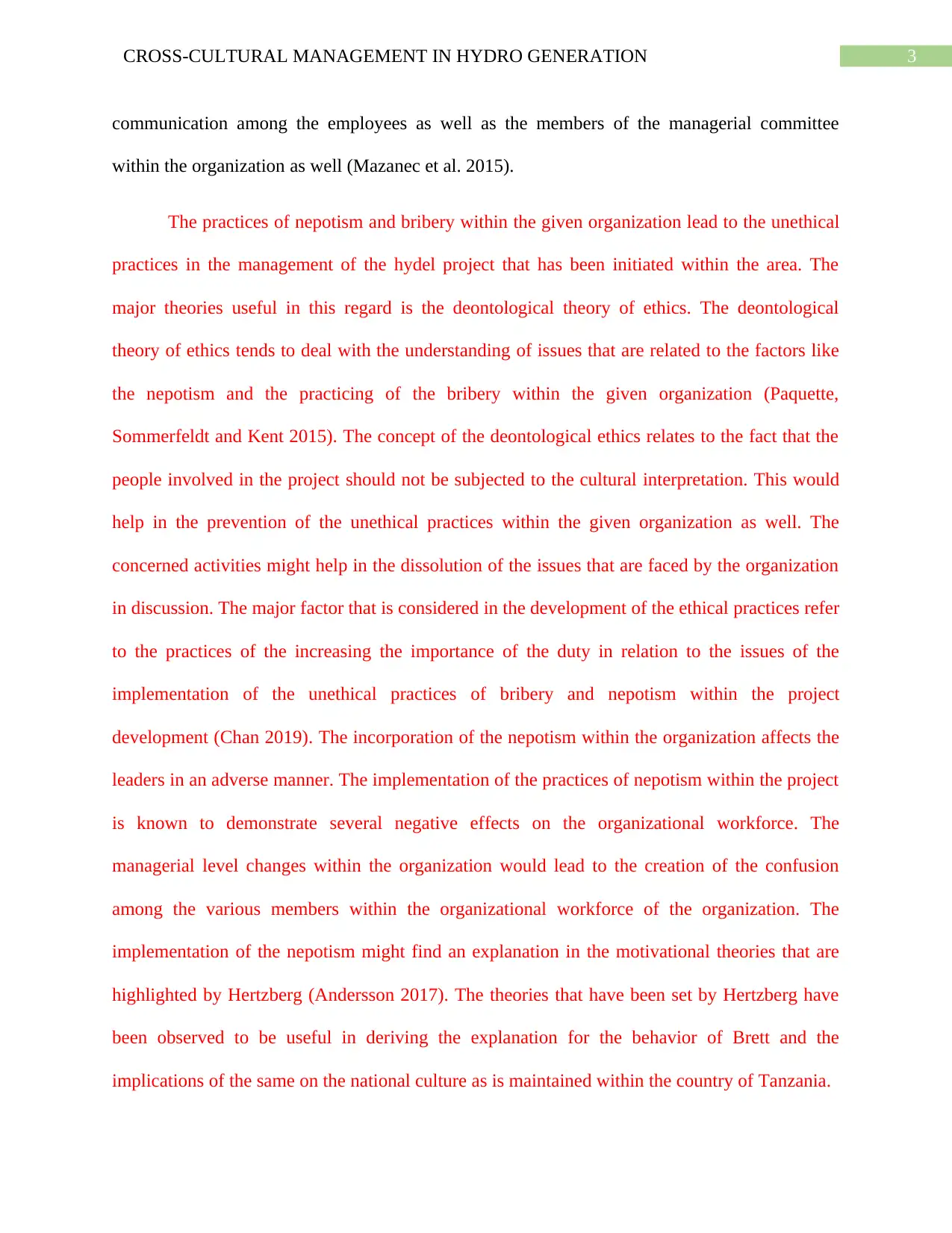
3CROSS-CULTURAL MANAGEMENT IN HYDRO GENERATION
communication among the employees as well as the members of the managerial committee
within the organization as well (Mazanec et al. 2015).
The practices of nepotism and bribery within the given organization lead to the unethical
practices in the management of the hydel project that has been initiated within the area. The
major theories useful in this regard is the deontological theory of ethics. The deontological
theory of ethics tends to deal with the understanding of issues that are related to the factors like
the nepotism and the practicing of the bribery within the given organization (Paquette,
Sommerfeldt and Kent 2015). The concept of the deontological ethics relates to the fact that the
people involved in the project should not be subjected to the cultural interpretation. This would
help in the prevention of the unethical practices within the given organization as well. The
concerned activities might help in the dissolution of the issues that are faced by the organization
in discussion. The major factor that is considered in the development of the ethical practices refer
to the practices of the increasing the importance of the duty in relation to the issues of the
implementation of the unethical practices of bribery and nepotism within the project
development (Chan 2019). The incorporation of the nepotism within the organization affects the
leaders in an adverse manner. The implementation of the practices of nepotism within the project
is known to demonstrate several negative effects on the organizational workforce. The
managerial level changes within the organization would lead to the creation of the confusion
among the various members within the organizational workforce of the organization. The
implementation of the nepotism might find an explanation in the motivational theories that are
highlighted by Hertzberg (Andersson 2017). The theories that have been set by Hertzberg have
been observed to be useful in deriving the explanation for the behavior of Brett and the
implications of the same on the national culture as is maintained within the country of Tanzania.
communication among the employees as well as the members of the managerial committee
within the organization as well (Mazanec et al. 2015).
The practices of nepotism and bribery within the given organization lead to the unethical
practices in the management of the hydel project that has been initiated within the area. The
major theories useful in this regard is the deontological theory of ethics. The deontological
theory of ethics tends to deal with the understanding of issues that are related to the factors like
the nepotism and the practicing of the bribery within the given organization (Paquette,
Sommerfeldt and Kent 2015). The concept of the deontological ethics relates to the fact that the
people involved in the project should not be subjected to the cultural interpretation. This would
help in the prevention of the unethical practices within the given organization as well. The
concerned activities might help in the dissolution of the issues that are faced by the organization
in discussion. The major factor that is considered in the development of the ethical practices refer
to the practices of the increasing the importance of the duty in relation to the issues of the
implementation of the unethical practices of bribery and nepotism within the project
development (Chan 2019). The incorporation of the nepotism within the organization affects the
leaders in an adverse manner. The implementation of the practices of nepotism within the project
is known to demonstrate several negative effects on the organizational workforce. The
managerial level changes within the organization would lead to the creation of the confusion
among the various members within the organizational workforce of the organization. The
implementation of the nepotism might find an explanation in the motivational theories that are
highlighted by Hertzberg (Andersson 2017). The theories that have been set by Hertzberg have
been observed to be useful in deriving the explanation for the behavior of Brett and the
implications of the same on the national culture as is maintained within the country of Tanzania.
Paraphrase This Document
Need a fresh take? Get an instant paraphrase of this document with our AI Paraphraser
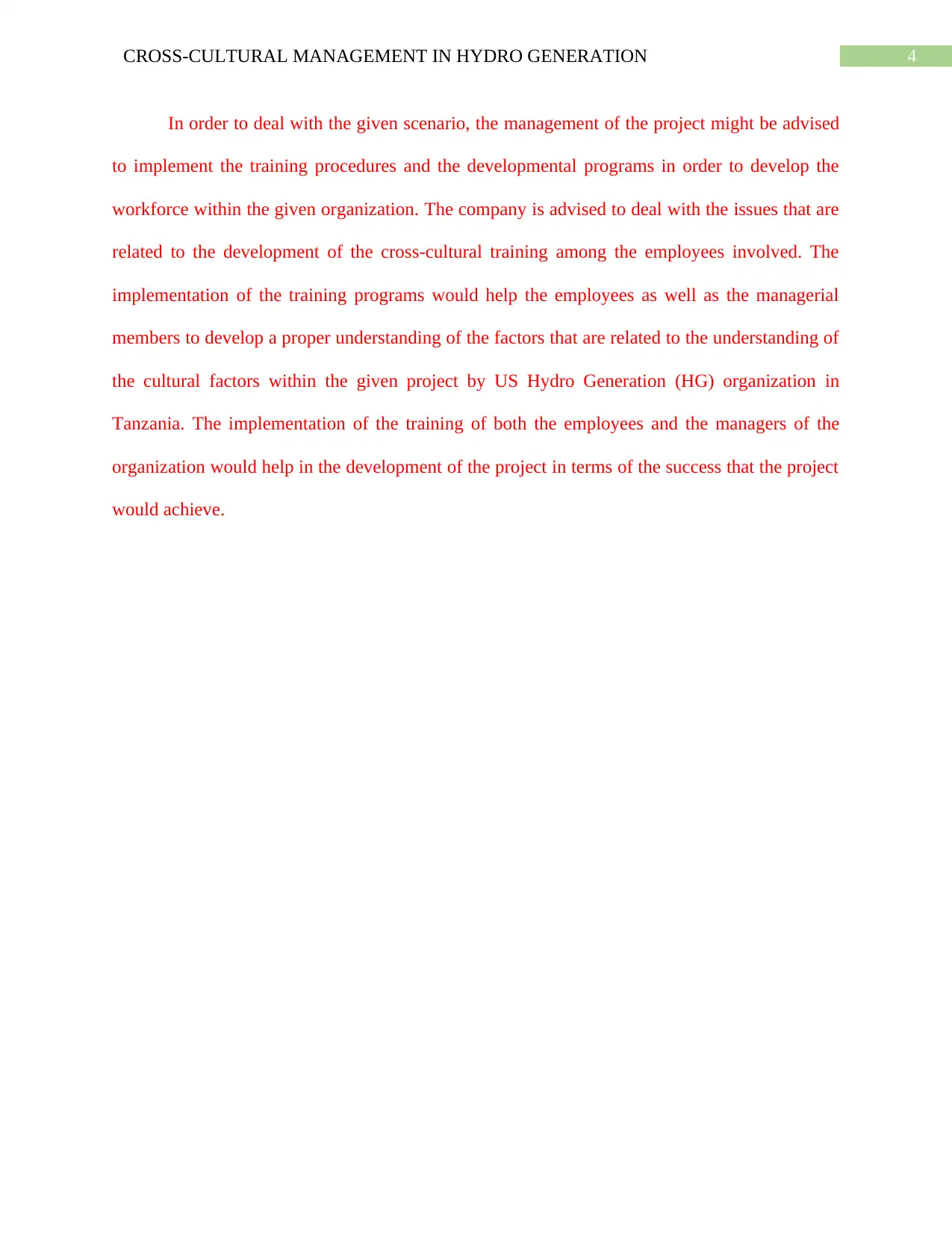
4CROSS-CULTURAL MANAGEMENT IN HYDRO GENERATION
In order to deal with the given scenario, the management of the project might be advised
to implement the training procedures and the developmental programs in order to develop the
workforce within the given organization. The company is advised to deal with the issues that are
related to the development of the cross-cultural training among the employees involved. The
implementation of the training programs would help the employees as well as the managerial
members to develop a proper understanding of the factors that are related to the understanding of
the cultural factors within the given project by US Hydro Generation (HG) organization in
Tanzania. The implementation of the training of both the employees and the managers of the
organization would help in the development of the project in terms of the success that the project
would achieve.
In order to deal with the given scenario, the management of the project might be advised
to implement the training procedures and the developmental programs in order to develop the
workforce within the given organization. The company is advised to deal with the issues that are
related to the development of the cross-cultural training among the employees involved. The
implementation of the training programs would help the employees as well as the managerial
members to develop a proper understanding of the factors that are related to the understanding of
the cultural factors within the given project by US Hydro Generation (HG) organization in
Tanzania. The implementation of the training of both the employees and the managers of the
organization would help in the development of the project in terms of the success that the project
would achieve.
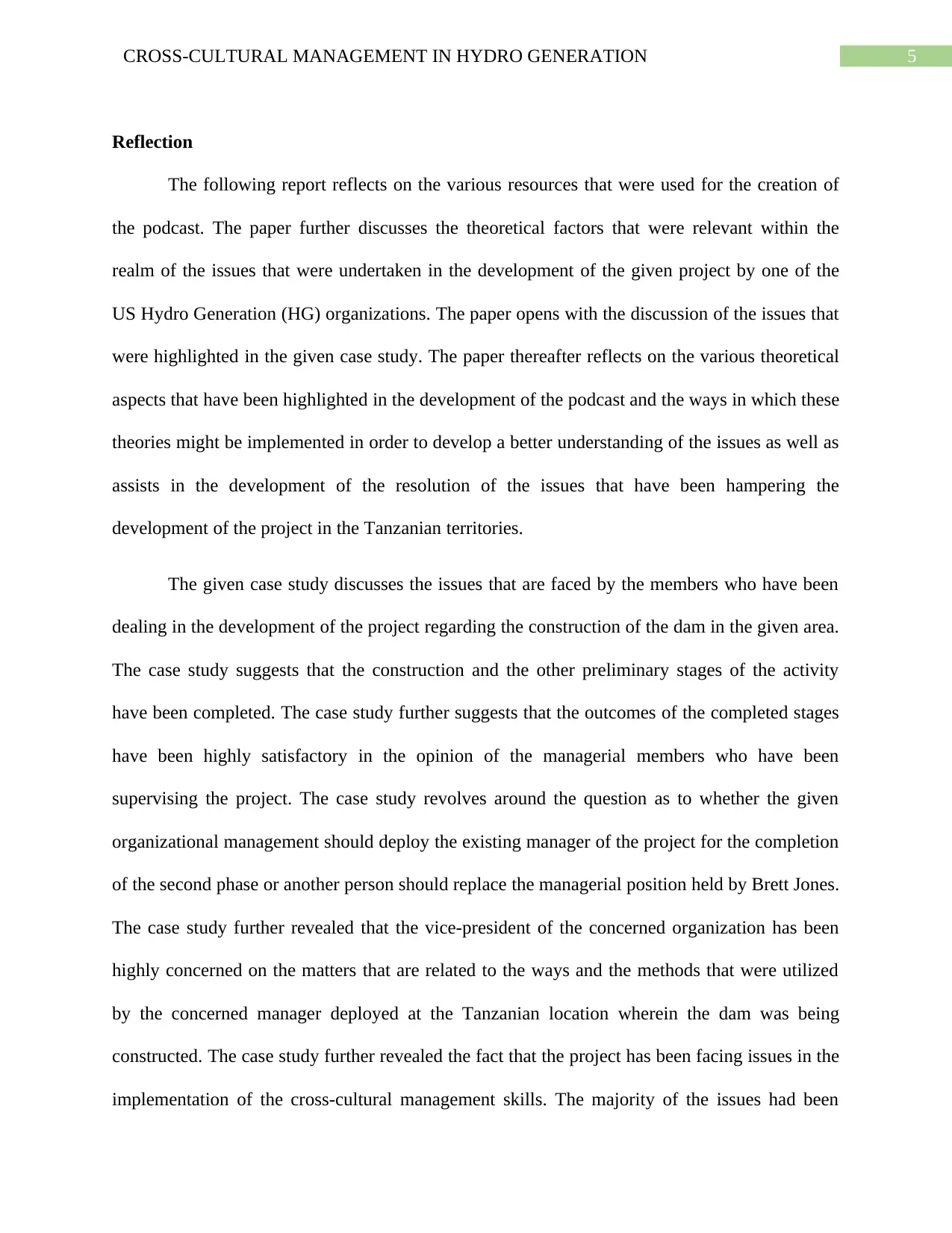
5CROSS-CULTURAL MANAGEMENT IN HYDRO GENERATION
Reflection
The following report reflects on the various resources that were used for the creation of
the podcast. The paper further discusses the theoretical factors that were relevant within the
realm of the issues that were undertaken in the development of the given project by one of the
US Hydro Generation (HG) organizations. The paper opens with the discussion of the issues that
were highlighted in the given case study. The paper thereafter reflects on the various theoretical
aspects that have been highlighted in the development of the podcast and the ways in which these
theories might be implemented in order to develop a better understanding of the issues as well as
assists in the development of the resolution of the issues that have been hampering the
development of the project in the Tanzanian territories.
The given case study discusses the issues that are faced by the members who have been
dealing in the development of the project regarding the construction of the dam in the given area.
The case study suggests that the construction and the other preliminary stages of the activity
have been completed. The case study further suggests that the outcomes of the completed stages
have been highly satisfactory in the opinion of the managerial members who have been
supervising the project. The case study revolves around the question as to whether the given
organizational management should deploy the existing manager of the project for the completion
of the second phase or another person should replace the managerial position held by Brett Jones.
The case study further revealed that the vice-president of the concerned organization has been
highly concerned on the matters that are related to the ways and the methods that were utilized
by the concerned manager deployed at the Tanzanian location wherein the dam was being
constructed. The case study further revealed the fact that the project has been facing issues in the
implementation of the cross-cultural management skills. The majority of the issues had been
Reflection
The following report reflects on the various resources that were used for the creation of
the podcast. The paper further discusses the theoretical factors that were relevant within the
realm of the issues that were undertaken in the development of the given project by one of the
US Hydro Generation (HG) organizations. The paper opens with the discussion of the issues that
were highlighted in the given case study. The paper thereafter reflects on the various theoretical
aspects that have been highlighted in the development of the podcast and the ways in which these
theories might be implemented in order to develop a better understanding of the issues as well as
assists in the development of the resolution of the issues that have been hampering the
development of the project in the Tanzanian territories.
The given case study discusses the issues that are faced by the members who have been
dealing in the development of the project regarding the construction of the dam in the given area.
The case study suggests that the construction and the other preliminary stages of the activity
have been completed. The case study further suggests that the outcomes of the completed stages
have been highly satisfactory in the opinion of the managerial members who have been
supervising the project. The case study revolves around the question as to whether the given
organizational management should deploy the existing manager of the project for the completion
of the second phase or another person should replace the managerial position held by Brett Jones.
The case study further revealed that the vice-president of the concerned organization has been
highly concerned on the matters that are related to the ways and the methods that were utilized
by the concerned manager deployed at the Tanzanian location wherein the dam was being
constructed. The case study further revealed the fact that the project has been facing issues in the
implementation of the cross-cultural management skills. The majority of the issues had been
⊘ This is a preview!⊘
Do you want full access?
Subscribe today to unlock all pages.

Trusted by 1+ million students worldwide
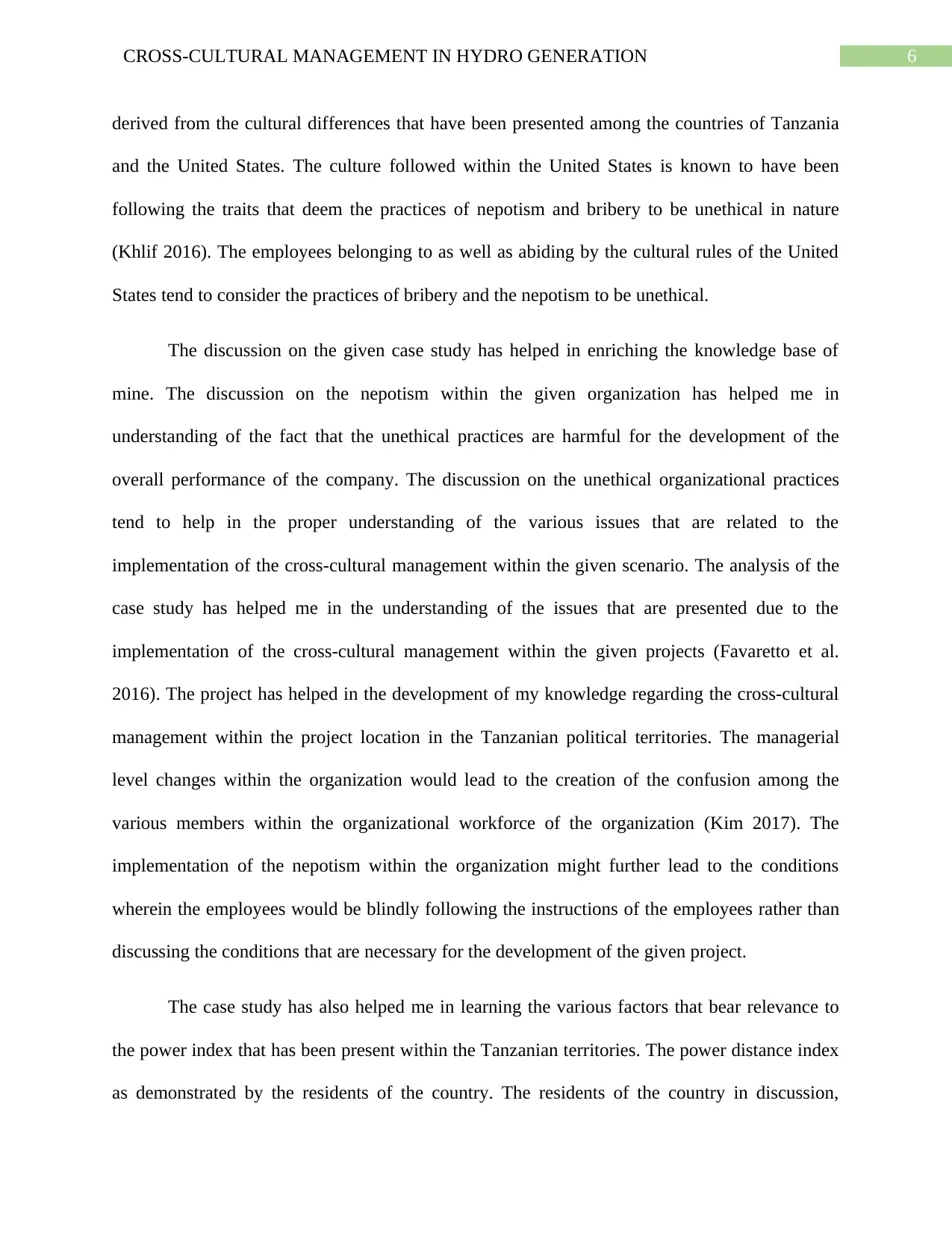
6CROSS-CULTURAL MANAGEMENT IN HYDRO GENERATION
derived from the cultural differences that have been presented among the countries of Tanzania
and the United States. The culture followed within the United States is known to have been
following the traits that deem the practices of nepotism and bribery to be unethical in nature
(Khlif 2016). The employees belonging to as well as abiding by the cultural rules of the United
States tend to consider the practices of bribery and the nepotism to be unethical.
The discussion on the given case study has helped in enriching the knowledge base of
mine. The discussion on the nepotism within the given organization has helped me in
understanding of the fact that the unethical practices are harmful for the development of the
overall performance of the company. The discussion on the unethical organizational practices
tend to help in the proper understanding of the various issues that are related to the
implementation of the cross-cultural management within the given scenario. The analysis of the
case study has helped me in the understanding of the issues that are presented due to the
implementation of the cross-cultural management within the given projects (Favaretto et al.
2016). The project has helped in the development of my knowledge regarding the cross-cultural
management within the project location in the Tanzanian political territories. The managerial
level changes within the organization would lead to the creation of the confusion among the
various members within the organizational workforce of the organization (Kim 2017). The
implementation of the nepotism within the organization might further lead to the conditions
wherein the employees would be blindly following the instructions of the employees rather than
discussing the conditions that are necessary for the development of the given project.
The case study has also helped me in learning the various factors that bear relevance to
the power index that has been present within the Tanzanian territories. The power distance index
as demonstrated by the residents of the country. The residents of the country in discussion,
derived from the cultural differences that have been presented among the countries of Tanzania
and the United States. The culture followed within the United States is known to have been
following the traits that deem the practices of nepotism and bribery to be unethical in nature
(Khlif 2016). The employees belonging to as well as abiding by the cultural rules of the United
States tend to consider the practices of bribery and the nepotism to be unethical.
The discussion on the given case study has helped in enriching the knowledge base of
mine. The discussion on the nepotism within the given organization has helped me in
understanding of the fact that the unethical practices are harmful for the development of the
overall performance of the company. The discussion on the unethical organizational practices
tend to help in the proper understanding of the various issues that are related to the
implementation of the cross-cultural management within the given scenario. The analysis of the
case study has helped me in the understanding of the issues that are presented due to the
implementation of the cross-cultural management within the given projects (Favaretto et al.
2016). The project has helped in the development of my knowledge regarding the cross-cultural
management within the project location in the Tanzanian political territories. The managerial
level changes within the organization would lead to the creation of the confusion among the
various members within the organizational workforce of the organization (Kim 2017). The
implementation of the nepotism within the organization might further lead to the conditions
wherein the employees would be blindly following the instructions of the employees rather than
discussing the conditions that are necessary for the development of the given project.
The case study has also helped me in learning the various factors that bear relevance to
the power index that has been present within the Tanzanian territories. The power distance index
as demonstrated by the residents of the country. The residents of the country in discussion,
Paraphrase This Document
Need a fresh take? Get an instant paraphrase of this document with our AI Paraphraser
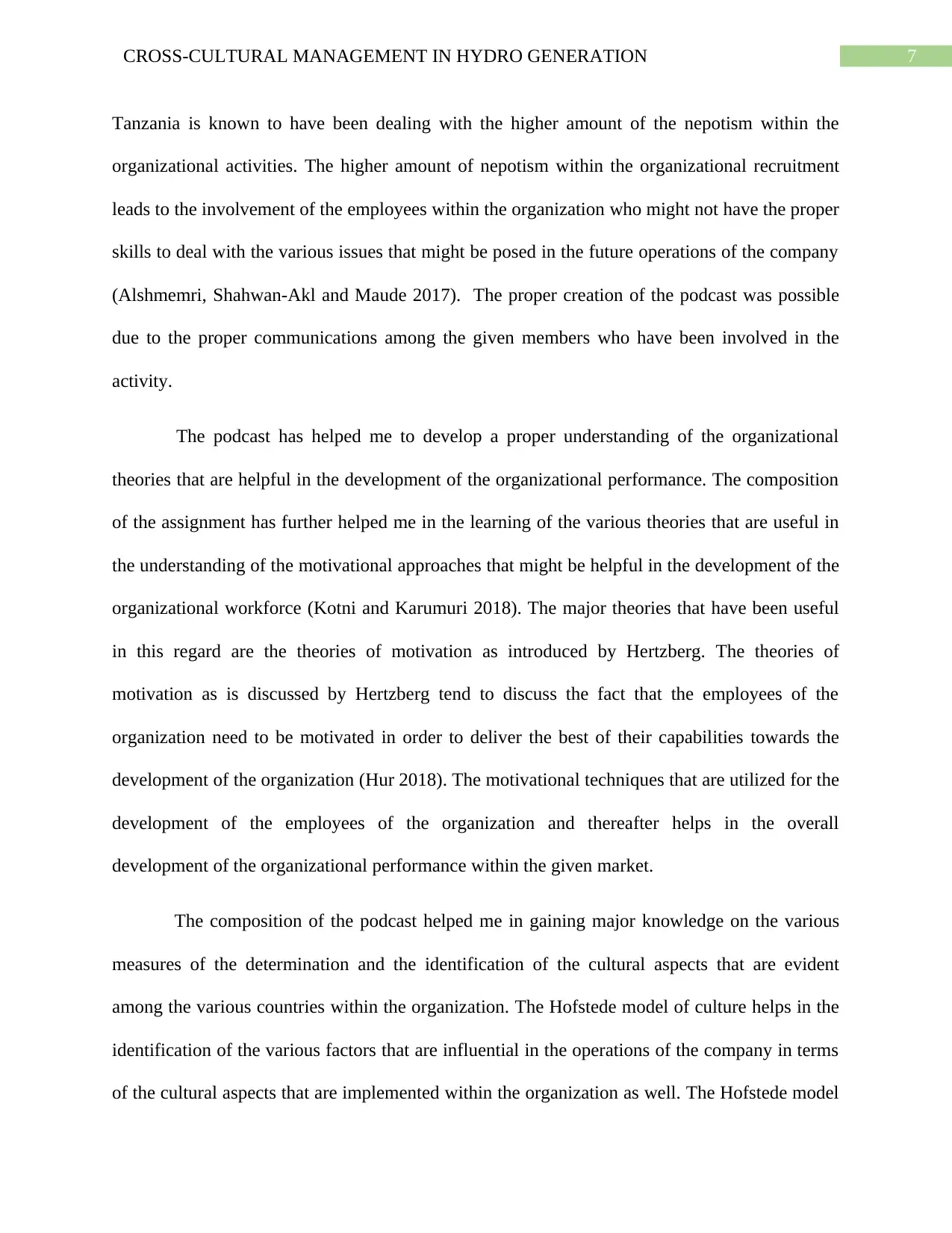
7CROSS-CULTURAL MANAGEMENT IN HYDRO GENERATION
Tanzania is known to have been dealing with the higher amount of the nepotism within the
organizational activities. The higher amount of nepotism within the organizational recruitment
leads to the involvement of the employees within the organization who might not have the proper
skills to deal with the various issues that might be posed in the future operations of the company
(Alshmemri, Shahwan-Akl and Maude 2017). The proper creation of the podcast was possible
due to the proper communications among the given members who have been involved in the
activity.
The podcast has helped me to develop a proper understanding of the organizational
theories that are helpful in the development of the organizational performance. The composition
of the assignment has further helped me in the learning of the various theories that are useful in
the understanding of the motivational approaches that might be helpful in the development of the
organizational workforce (Kotni and Karumuri 2018). The major theories that have been useful
in this regard are the theories of motivation as introduced by Hertzberg. The theories of
motivation as is discussed by Hertzberg tend to discuss the fact that the employees of the
organization need to be motivated in order to deliver the best of their capabilities towards the
development of the organization (Hur 2018). The motivational techniques that are utilized for the
development of the employees of the organization and thereafter helps in the overall
development of the organizational performance within the given market.
The composition of the podcast helped me in gaining major knowledge on the various
measures of the determination and the identification of the cultural aspects that are evident
among the various countries within the organization. The Hofstede model of culture helps in the
identification of the various factors that are influential in the operations of the company in terms
of the cultural aspects that are implemented within the organization as well. The Hofstede model
Tanzania is known to have been dealing with the higher amount of the nepotism within the
organizational activities. The higher amount of nepotism within the organizational recruitment
leads to the involvement of the employees within the organization who might not have the proper
skills to deal with the various issues that might be posed in the future operations of the company
(Alshmemri, Shahwan-Akl and Maude 2017). The proper creation of the podcast was possible
due to the proper communications among the given members who have been involved in the
activity.
The podcast has helped me to develop a proper understanding of the organizational
theories that are helpful in the development of the organizational performance. The composition
of the assignment has further helped me in the learning of the various theories that are useful in
the understanding of the motivational approaches that might be helpful in the development of the
organizational workforce (Kotni and Karumuri 2018). The major theories that have been useful
in this regard are the theories of motivation as introduced by Hertzberg. The theories of
motivation as is discussed by Hertzberg tend to discuss the fact that the employees of the
organization need to be motivated in order to deliver the best of their capabilities towards the
development of the organization (Hur 2018). The motivational techniques that are utilized for the
development of the employees of the organization and thereafter helps in the overall
development of the organizational performance within the given market.
The composition of the podcast helped me in gaining major knowledge on the various
measures of the determination and the identification of the cultural aspects that are evident
among the various countries within the organization. The Hofstede model of culture helps in the
identification of the various factors that are influential in the operations of the company in terms
of the cultural aspects that are implemented within the organization as well. The Hofstede model
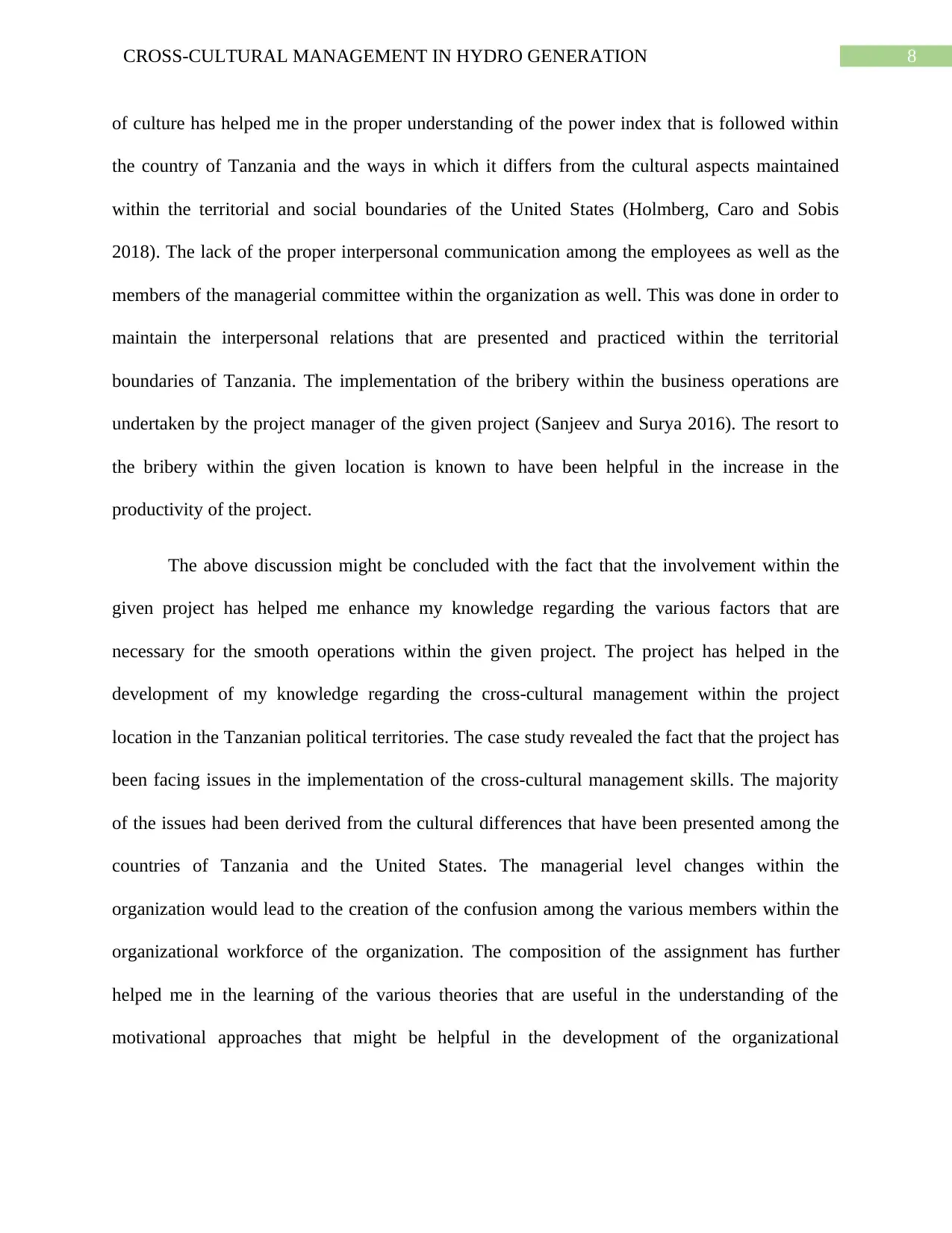
8CROSS-CULTURAL MANAGEMENT IN HYDRO GENERATION
of culture has helped me in the proper understanding of the power index that is followed within
the country of Tanzania and the ways in which it differs from the cultural aspects maintained
within the territorial and social boundaries of the United States (Holmberg, Caro and Sobis
2018). The lack of the proper interpersonal communication among the employees as well as the
members of the managerial committee within the organization as well. This was done in order to
maintain the interpersonal relations that are presented and practiced within the territorial
boundaries of Tanzania. The implementation of the bribery within the business operations are
undertaken by the project manager of the given project (Sanjeev and Surya 2016). The resort to
the bribery within the given location is known to have been helpful in the increase in the
productivity of the project.
The above discussion might be concluded with the fact that the involvement within the
given project has helped me enhance my knowledge regarding the various factors that are
necessary for the smooth operations within the given project. The project has helped in the
development of my knowledge regarding the cross-cultural management within the project
location in the Tanzanian political territories. The case study revealed the fact that the project has
been facing issues in the implementation of the cross-cultural management skills. The majority
of the issues had been derived from the cultural differences that have been presented among the
countries of Tanzania and the United States. The managerial level changes within the
organization would lead to the creation of the confusion among the various members within the
organizational workforce of the organization. The composition of the assignment has further
helped me in the learning of the various theories that are useful in the understanding of the
motivational approaches that might be helpful in the development of the organizational
of culture has helped me in the proper understanding of the power index that is followed within
the country of Tanzania and the ways in which it differs from the cultural aspects maintained
within the territorial and social boundaries of the United States (Holmberg, Caro and Sobis
2018). The lack of the proper interpersonal communication among the employees as well as the
members of the managerial committee within the organization as well. This was done in order to
maintain the interpersonal relations that are presented and practiced within the territorial
boundaries of Tanzania. The implementation of the bribery within the business operations are
undertaken by the project manager of the given project (Sanjeev and Surya 2016). The resort to
the bribery within the given location is known to have been helpful in the increase in the
productivity of the project.
The above discussion might be concluded with the fact that the involvement within the
given project has helped me enhance my knowledge regarding the various factors that are
necessary for the smooth operations within the given project. The project has helped in the
development of my knowledge regarding the cross-cultural management within the project
location in the Tanzanian political territories. The case study revealed the fact that the project has
been facing issues in the implementation of the cross-cultural management skills. The majority
of the issues had been derived from the cultural differences that have been presented among the
countries of Tanzania and the United States. The managerial level changes within the
organization would lead to the creation of the confusion among the various members within the
organizational workforce of the organization. The composition of the assignment has further
helped me in the learning of the various theories that are useful in the understanding of the
motivational approaches that might be helpful in the development of the organizational
⊘ This is a preview!⊘
Do you want full access?
Subscribe today to unlock all pages.

Trusted by 1+ million students worldwide

9CROSS-CULTURAL MANAGEMENT IN HYDRO GENERATION
workforce. The overall participation in the composition of the podcast has helped in the
development of my understanding of the cross-cultural management concepts.
workforce. The overall participation in the composition of the podcast has helped in the
development of my understanding of the cross-cultural management concepts.
Paraphrase This Document
Need a fresh take? Get an instant paraphrase of this document with our AI Paraphraser
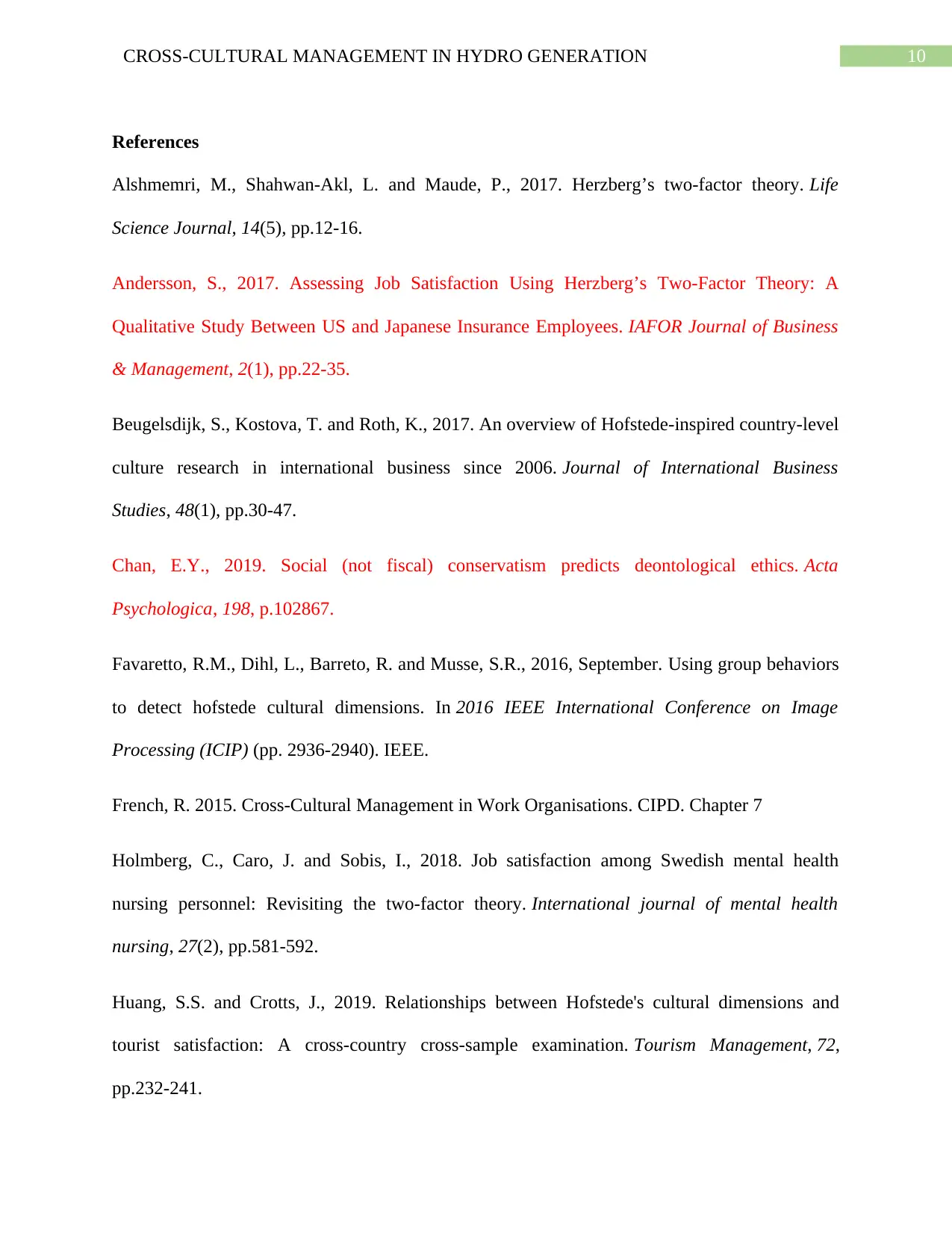
10CROSS-CULTURAL MANAGEMENT IN HYDRO GENERATION
References
Alshmemri, M., Shahwan-Akl, L. and Maude, P., 2017. Herzberg’s two-factor theory. Life
Science Journal, 14(5), pp.12-16.
Andersson, S., 2017. Assessing Job Satisfaction Using Herzberg’s Two-Factor Theory: A
Qualitative Study Between US and Japanese Insurance Employees. IAFOR Journal of Business
& Management, 2(1), pp.22-35.
Beugelsdijk, S., Kostova, T. and Roth, K., 2017. An overview of Hofstede-inspired country-level
culture research in international business since 2006. Journal of International Business
Studies, 48(1), pp.30-47.
Chan, E.Y., 2019. Social (not fiscal) conservatism predicts deontological ethics. Acta
Psychologica, 198, p.102867.
Favaretto, R.M., Dihl, L., Barreto, R. and Musse, S.R., 2016, September. Using group behaviors
to detect hofstede cultural dimensions. In 2016 IEEE International Conference on Image
Processing (ICIP) (pp. 2936-2940). IEEE.
French, R. 2015. Cross-Cultural Management in Work Organisations. CIPD. Chapter 7
Holmberg, C., Caro, J. and Sobis, I., 2018. Job satisfaction among Swedish mental health
nursing personnel: Revisiting the two‐factor theory. International journal of mental health
nursing, 27(2), pp.581-592.
Huang, S.S. and Crotts, J., 2019. Relationships between Hofstede's cultural dimensions and
tourist satisfaction: A cross-country cross-sample examination. Tourism Management, 72,
pp.232-241.
References
Alshmemri, M., Shahwan-Akl, L. and Maude, P., 2017. Herzberg’s two-factor theory. Life
Science Journal, 14(5), pp.12-16.
Andersson, S., 2017. Assessing Job Satisfaction Using Herzberg’s Two-Factor Theory: A
Qualitative Study Between US and Japanese Insurance Employees. IAFOR Journal of Business
& Management, 2(1), pp.22-35.
Beugelsdijk, S., Kostova, T. and Roth, K., 2017. An overview of Hofstede-inspired country-level
culture research in international business since 2006. Journal of International Business
Studies, 48(1), pp.30-47.
Chan, E.Y., 2019. Social (not fiscal) conservatism predicts deontological ethics. Acta
Psychologica, 198, p.102867.
Favaretto, R.M., Dihl, L., Barreto, R. and Musse, S.R., 2016, September. Using group behaviors
to detect hofstede cultural dimensions. In 2016 IEEE International Conference on Image
Processing (ICIP) (pp. 2936-2940). IEEE.
French, R. 2015. Cross-Cultural Management in Work Organisations. CIPD. Chapter 7
Holmberg, C., Caro, J. and Sobis, I., 2018. Job satisfaction among Swedish mental health
nursing personnel: Revisiting the two‐factor theory. International journal of mental health
nursing, 27(2), pp.581-592.
Huang, S.S. and Crotts, J., 2019. Relationships between Hofstede's cultural dimensions and
tourist satisfaction: A cross-country cross-sample examination. Tourism Management, 72,
pp.232-241.
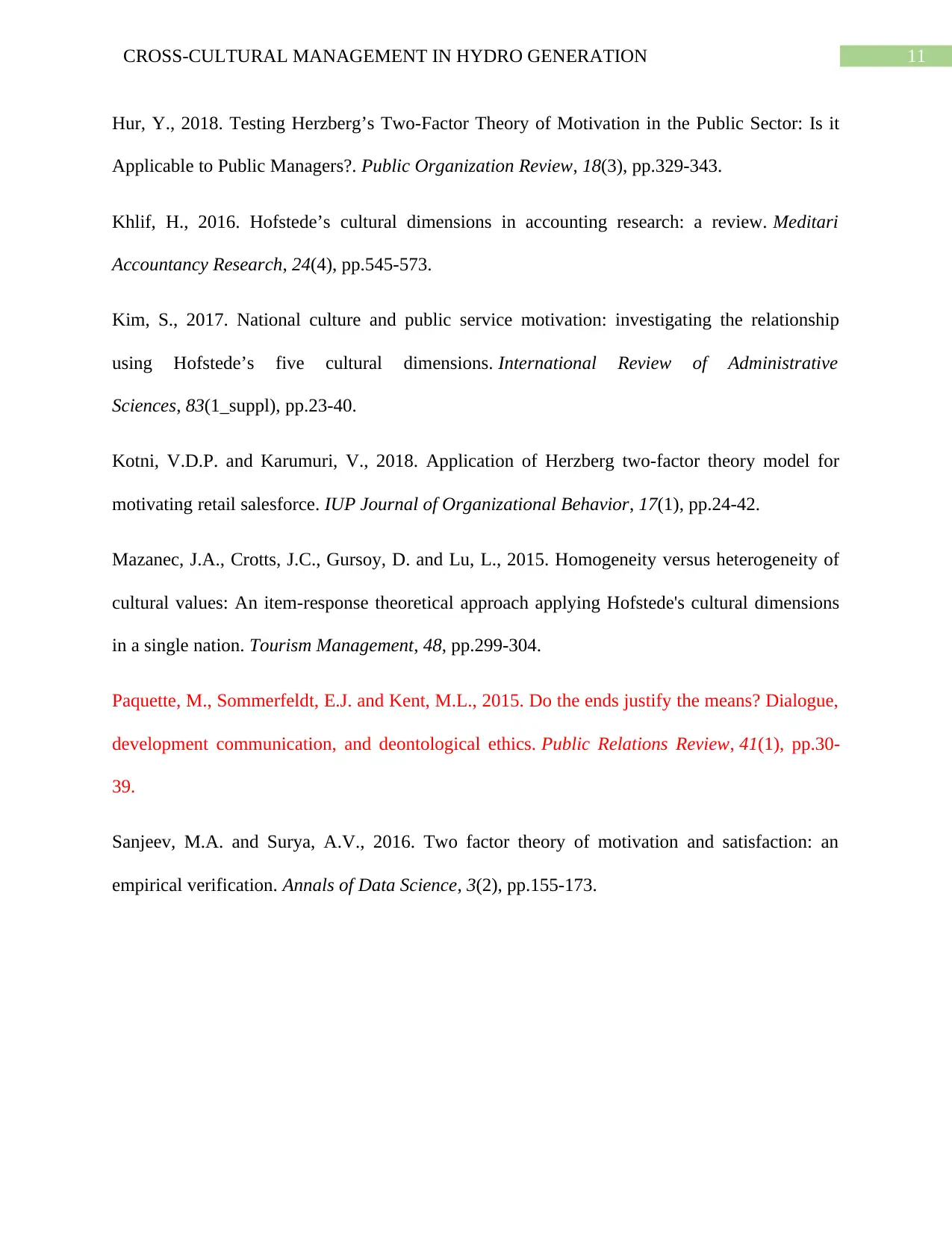
11CROSS-CULTURAL MANAGEMENT IN HYDRO GENERATION
Hur, Y., 2018. Testing Herzberg’s Two-Factor Theory of Motivation in the Public Sector: Is it
Applicable to Public Managers?. Public Organization Review, 18(3), pp.329-343.
Khlif, H., 2016. Hofstede’s cultural dimensions in accounting research: a review. Meditari
Accountancy Research, 24(4), pp.545-573.
Kim, S., 2017. National culture and public service motivation: investigating the relationship
using Hofstede’s five cultural dimensions. International Review of Administrative
Sciences, 83(1_suppl), pp.23-40.
Kotni, V.D.P. and Karumuri, V., 2018. Application of Herzberg two-factor theory model for
motivating retail salesforce. IUP Journal of Organizational Behavior, 17(1), pp.24-42.
Mazanec, J.A., Crotts, J.C., Gursoy, D. and Lu, L., 2015. Homogeneity versus heterogeneity of
cultural values: An item-response theoretical approach applying Hofstede's cultural dimensions
in a single nation. Tourism Management, 48, pp.299-304.
Paquette, M., Sommerfeldt, E.J. and Kent, M.L., 2015. Do the ends justify the means? Dialogue,
development communication, and deontological ethics. Public Relations Review, 41(1), pp.30-
39.
Sanjeev, M.A. and Surya, A.V., 2016. Two factor theory of motivation and satisfaction: an
empirical verification. Annals of Data Science, 3(2), pp.155-173.
Hur, Y., 2018. Testing Herzberg’s Two-Factor Theory of Motivation in the Public Sector: Is it
Applicable to Public Managers?. Public Organization Review, 18(3), pp.329-343.
Khlif, H., 2016. Hofstede’s cultural dimensions in accounting research: a review. Meditari
Accountancy Research, 24(4), pp.545-573.
Kim, S., 2017. National culture and public service motivation: investigating the relationship
using Hofstede’s five cultural dimensions. International Review of Administrative
Sciences, 83(1_suppl), pp.23-40.
Kotni, V.D.P. and Karumuri, V., 2018. Application of Herzberg two-factor theory model for
motivating retail salesforce. IUP Journal of Organizational Behavior, 17(1), pp.24-42.
Mazanec, J.A., Crotts, J.C., Gursoy, D. and Lu, L., 2015. Homogeneity versus heterogeneity of
cultural values: An item-response theoretical approach applying Hofstede's cultural dimensions
in a single nation. Tourism Management, 48, pp.299-304.
Paquette, M., Sommerfeldt, E.J. and Kent, M.L., 2015. Do the ends justify the means? Dialogue,
development communication, and deontological ethics. Public Relations Review, 41(1), pp.30-
39.
Sanjeev, M.A. and Surya, A.V., 2016. Two factor theory of motivation and satisfaction: an
empirical verification. Annals of Data Science, 3(2), pp.155-173.
⊘ This is a preview!⊘
Do you want full access?
Subscribe today to unlock all pages.

Trusted by 1+ million students worldwide
1 out of 12
Related Documents
Your All-in-One AI-Powered Toolkit for Academic Success.
+13062052269
info@desklib.com
Available 24*7 on WhatsApp / Email
![[object Object]](/_next/static/media/star-bottom.7253800d.svg)
Unlock your academic potential
Copyright © 2020–2026 A2Z Services. All Rights Reserved. Developed and managed by ZUCOL.





